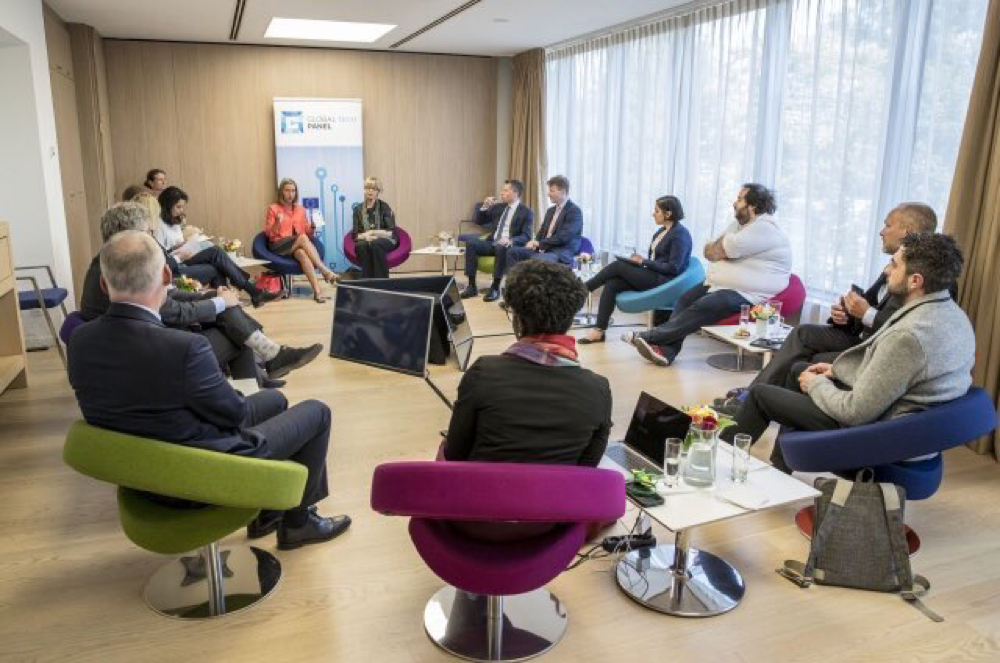Article

The double-edged sword of technology means digital companies and governments need a new language to
As the Global Tech Panel kicks off in Brussels today, panellists Risto Siilasmaa and Tom Fletcher explore why the old ways of laying down the rules for tech firms are no longer working.
Today, the Global Tech Panel meets for the first time. Convened by EU foreign policy chief Federica Mogherini, it will bring together a new coalition of leaders from the worlds of government, technology and civil society.
The panel is a result of several realisations, all of them overdue. Governments are recognising that they are not sufficiently resourced or agile to crack the challenges of the 21st century alone. Exponentially developing technologies are starting to move so rapidly that governmental processes which are, at best, keeping pace, cannot contain the impact on society, so we need more effective partnerships with civil society, business and citizens.
Meanwhile, technology companies are realising they are creating opportunities – and risks – faster than anyone can manage them. Digital technology is a double-edged sword. The rules simply can’t keep up. In just one example, last year 116 technology and artificial intelligence experts, including Elon Musk, signed an open letter to the UN calling for a ban on autonomous weapons, killing machines which replace human soldiers in the field.
These concerns are warranted. We should treat these weapons the same way we treat chemical and biological weapons and seek similar treaties and international enforcement.
And tech companies and governments are finally realising that the old ways of talking to each other no longer work. You cannot build meaningful partnerships with ego-driven, set piece conferences. Governments have often talked to tech companies like naughty schoolchildren who need to step back into line. Parliamentary committees are made to look like George Foreman against Muhammad Ali as they try to hold tech leaders accountable for greater self-regulation. And the new tech emperors, disruptive by nature, have little time or patience for the checks and balances constructed over centuries to restrain the old emperors.
So we will need to either speed up societal decision-making or get better at predicting technology’s impact and use that to come out with more future-proof regulation; ideally both.
We have no time to lose and the collective to-do list is pretty daunting. Whether it’s responding to climate change, inequality, automation or new weapons, positive change requires a new approach if we are to shift the dial back towards progress. Everyone has a right to live, trade, work, learn and travel safely. But the international mechanisms to deliver these rights are fragile. From financial attacks to terrorism, many of the greatest threats to individuals and governments are now tech-enabled.
There are three major challenges to crack together, in the Global Tech Panel and beyond. First, to give peacemaking and peacekeeping the same technological teeth as warfare. Humans have form in finding more ingenious ways of killing each other. But we also have form in finding rules to manage new weapons, and to co-exist.
That means a shared approach to artificial intelligence, to autonomous weapons and to online extremism. Containing the negative influences of technology is much like the decades-long fight against cybercrime, where the forces trying to prevent online crime have been in a race-like situation with the online underworld. Both sides will be developing technologies such as AI in competition. And all large countries are already investing significantly in AI-based weapon systems.
Second, if we are going to spend most of our lives online, we need to work out how to apply existing human rights and values to the internet and to ensure the rules can keep pace with human creativity without stifling it. This means much clearer individual control of our digital identities and safeguards that can guarantee it.
Third, we must ready ourselves for the greatest movement of people in history. We were all migrants once and the 21st century might make us migrants again. There are an estimated 258 million migrants today, more than at any time in history, and more than 65 million forcibly displaced people worldwide, according to figures from the UN. The organisation estimates that about $40 billion will be needed every year to address the growing number of people in need of humanitarian help around the world due to conflicts and natural disasters. Our response must be driven by compassion but that will not be enough. We need new, tech-enabled ways to offer help.
Connectivity is going to be a great leveller: for every 10 people who come online, one is lifted out of poverty. That is surely an objective upon which governments and tech leaders can agree. And we should help our societies recognise the economic potential of migrants and refugees, from Albert Einstein to Steve Jobs.
The masterful US diplomat Richard Holbrooke used to say: “Attack the problem from every angle and bring in unusual people". As humans, we have navigated previous periods of tumultuous change. The Stone Age didn't end because we ran out of stones. We can help more people take advantage of the huge opportunities of technology while countering its growing threats and helping those left behind. The new panel can be part of that effort if it works in a spirit of genuine, practical, problem-solving collaboration.
Governments and technology companies need a find a new way to combine the vital entrepreneurial drive of the tech sector with the individual freedoms and rule of law that our predecessors built with such patience and sacrifice. We need to co-invest in a new joint venture: opportunity. We have been talking past each other too long. In an era of hyper-connectivity, it is time to connect.
Nokia chairman Risto Siilasmaa and former UK ambassador Tom Fletcher, the author of The Naked Diplomat: Power and Politics in the Digital Age, are members of the Global Tech Panel.

